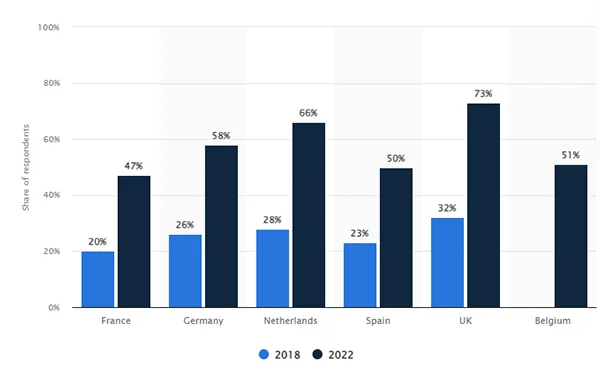Call Recording and Data Privacy Regulations: Navigating Compliance in Business Operations
Starting from May 25, 2018, the General Data Protection Regulation, or GDPR, becomes a pivotal legal framework within Europe. It’s a game-changer for businesses of all sizes that deal with data processing. Given that call recording is a form of input processing, its impact on the practice is significant.
GDPR aims to boost the rights of individuals around the personal info that companies handle—its collection, recording, and usage. Besides, the previous Data Protection Act outlines stringent input handling protocols. These keepings, part of this bracket, must be protected rigorously. Encrypting dialed logs is a wise, often recommended method for securing such records.
The operators should now navigate a transformed landscape where rigid measures ensure personal information stays private and safe. Many more documents govern phone recording for organizations, but most of them follow general rules. Also, learn about the Inbound Call Centers with this guide.
What Does Compliance with Regulatory Requirements Mean When Recording Calls?

(This graph shows the GDPR awareness for users in selected European countries in 2018 and 2022, in %).
Tapping customer conversations involves handling sensitive information, which is now under the supervision of the regulator. For compliance, businesses must adhere to strict protocols regarding recording and storage, which include:
Securing Informed Consent
The days of presumed consent through uninterrupted call participation are over. Today’s standards demand that customer service representatives actively procure specific authorization from visitors to proceed with recordings.
Clear Disclosure
Unlike pre-GDPR practices, vague explanations are no longer sufficient. It is imperative for companies to transparently convey the purpose of storing. The caller should be aware of why their conversation is being recorded, which could range from fulfilling contractual obligations to meeting legal requirements or even safeguarding someone’s fundamental welfare.
With the increasing importance of conversation recording, recorder tools are also improving. Now you can get by with an iPhone call recorder app rather than complex business systems. You can use an automatic call recorder app with the same capabilities as more complex systems. In addition to keeping communication, they allow you to listen and share savings anywhere and anytime. The segment leader is now iCall. Another argument in its favor is the presence of an iPhone phone recorder but remember the free trial period. This is a great chance to test the software.
Conditions for Recording
The GDPR outlines precise conditions under which call recordings are permissible:
- Unified consent for precise, declared intentions.
- Contractual necessity involving the participants.
- Compliance with legal stipulations mandated for the company.
- Protection of demanding interests belonging to a participant or third party.
- Recordings motivated by public interest or necessary for official functions.
Instances where the enterprise’s legitimate interests align with the tapping, barring any suppression of other participants’ rights. Companies are tasked with full disclosure of the saving specifics, including the timeline, location, and methodology.
GDPR-Compliant Data Handling

Personal info associated with EU citizens or residents must be preserved on servers in Europe or regions with equivalent privacy protection.
Adhering to Data Subject Rights:
- Recordings necessitate conformity with Data Subject Rights. Individuals may:
- Inquire about stored records specifics.
- Rectify any erroneous personal information.
- Request erasure.
- Limit usage when deletion isn’t immediately possible due to legal conditions.
- Transfer input.
- Oppose data processing activities.
- Revoke previously granted permission.
Requests about these rights should be accommodated within a one-month timeframe.
Retention Norms
Secure encryption and access restrictions are urgent for recorded calls. Third-party sharing is strictly conditional on receiving additional explicit consent.
Right to Access Data
Under GDPR mandates, it’s mandatory that clients can retrieve their personal information held by businesses; this includes any recorded phone conversations. If a client asks to review a recorded conversation, the company has only 30 days to comply.
Effective search and retrieval systems for archives are, thereby, vital for agreement. It isn’t sufficient to simply store these calls on a server without a method for easy access.
Who Should Follow GDPR?
Every company that manages data from EU citizens must adhere to GDPR regulations, irrespective of their physical location. Remember this vital point: non-EU companies are not exempt from compliance. Suppose you’re engaging in activities such as processing residents’ information.
Presenting goods or services to individuals in Europe, or tracking consumer behavior within the territories—will apply to you. Even though it does provide certain leeway for smaller enterprises that fit particular requirements, most businesses will have to align with its protocols upon interacting with EU citizens or managing their input.
If your business falls into these categories, it’s time to reassess your records management practices for GDPR obedience.
Conclusion
Technical and procedural safeguards are mandatory for records storage and movement, ensuring robust protection. Organizations striving for GDPR compliance must precisely implement these directives to avoid penalties and uphold information privacy standards.
In Europe, businesses should navigate the intricacies of their agreements or risk significant penalties. Adopting best practices is necessary; businesses benefit from obtaining clear consent, detailing data usage intentions transparently, and adhering to the prescribed Right to Access and Right to Forget protocols. Integrating software solutions designed with GDPR consent at their core, streamlines these processes, mitigating non-compliance risks.
